|
|
| |
| EVENTS |
|
|
> Anti-Money Laundering Ordinance -2007 Analysed; Review Proposed in keeping with National and International Considerations
PILDAT Exclusive Briefings on Money Laundering and Pakistan for Senior Government Official and Media Persons |
| |
|
Briefing Sessions
December 05, 2008
Hotel Serena, Islamabad
|
|
| |
Islamabad, December 4 and 5, 2008: PILDAT organised two exclusive Briefing Sessions for Senior Government Officials and Media Persons on Money Laundering and Pakistan on December 4 and 5 respectively in Islamabad. |
|
| |
Money laundering and its linkage to terrorism financing have become subjects of intense international interest especially after 9/11. Anti money laundering laws have, therefore, assumed a great significance in almost all countries of the world. An Anti-Money Laundering Bill remained pending with the 12th National Assembly of Pakistan (2002-2007) for over a year after which an Anti-Money Laundering Ordinance was promulgated by the President of Pakistan on September 07, 2007. Some experts argue that the Anti Money-Laundering Ordinance 2007 (AMLO 2007) does not fully meet the international standards and needs amendments. It is understood that the Government of Pakistan is currently considering possible amendments which may soon be introduced in the Parliament in the form of an amendment bill. PILDAT felt that it is important for Senior Government Officials, Media, Members of Parliament as well as all other stakeholders, to understand the significance of Anti Money Laundering Laws for Pakistan, compare Pakistani AML laws with similar laws in the region and how money laundering impacts Pakistan.
|
|
| |
The two briefings by PILDAT were organized so as to provide an opportunity to the key stakeholders to understand key features, strengths and weaknesses of the current Anti-Money Laundering Ordinance-2007 and know what can be possible amendments to the law. |
|
| |
The 1st Briefing Session for Government Officials on December 04, 2008 was held at Islamabad Club, Islamabad and was widely participated by senior officials in Ministries of Finance and Revenue, Law and Justice, Interior; Foreign Affairs; State Bank of Pakistan and Planning Commission; Securities and Exchange Commission of Pakistan, Anti-Narcotics Force personnel; Federal Intelligence Agency personnel; Federal Board of Revenue; National Accountability Bureau etc. Speakers at the Briefing Session for Government Officials included Mr. Shahid Hamid, Senior Advocate Supreme Court and Former Governor Punjab; Mr. Sajid Khan, Joint Secretary, Internal Finance Cell, Ministry of Finance; Mr. Azhar Iqbal Kureshi, Director General, Financial Monitoring Unit, State Bank of Pakistan; Mr. Ahmer Bilal Soofi, President, Research Society for International Law and Senior Advocate at Supreme court; Mr. Haroon Sharif, Advisor, Department for International Development Pakistan Office and Mr. Raheel Rana, Bank Secrecy Act and Anti-Money Laundering Expert at Atlas Bank, Karachi. |
|
| |
PILDAT especially prepared three publications on the subject: Legislative Brief on Anti Money Laundering Bill; Briefing Paper on Pakistan�s Anti-Money Laundering Legislation and a Comparative Study on Anti-Money Laundering Legislations in the Region, which were circulated among the participants during the briefing sessions. |
|
| |
The speakers at the PILDAT Briefing for Media Persons included Mr. Ahmer Bilal Soofi, President, Research Society for International Law and Senior Advocate at Supreme court; Mr. Raheel Rana, Bank Secrecy Act and Anti-Money Laundering Expert at Atlas Bank, Karachi, Mr. Zia Uddin, Bureau Chief, Dawn News, London and Mr. Mazhar Abbas, President of Pakistan Federal Union of Journalists. Mr. Ahmed Bilal Mehboob, Executive Director, PILDAT, moderated both the sessions by delivering inaugural remarks and later moderating the briefing and the Q&A sessions. |
|
| |
In both the briefings, participants were briefed about the meaning, origin and stages of money laundering and the legal placement of the current Anti Money Laundering Ordinance 45%7 (AMLO 45%7) in the international system. Various speakers discussed the need to come up with an effective and strong Anti-Money Laundering regime in Pakistan keeping in view Pakistan�s internal concerns and considerations and to ensure health of Pakistan�s economy, security and integrity. |
|
| |
Mr. Raheel Rana, the opening speaker of both the Briefings explained the meaning of the two terms �money laundering� and �terrorist financing� and said that some of the sources of funding of these crimes can be drug trafficking; arms trafficking; fraud; counterfeiting; racketeering and environmental violations. He said that creativity, merging illegal funds with legal ones, speed of electronic and informal transactions and frequency of those transactions are major challenges faced internationally in an effort to combat money laundering and terrorist financing. He explained the stages of money laundering and said that the means of both money launderers and terrorist financiers converge while the aim of money launderers is economic gains and that of terrorists is not money but terrorism itself. He said that it is a global crime and no country is immune to it. He concluded by proposing awareness programmes to educate the people through media in order to help the stakeholders acquire proper understanding and political will to curb money laundering. He also proposed professional trainings of government officials specifically in the Financial Monitoring Unit. |
|
| |
Mr. Ahmer Bilal Soofi covered the legislative aspect of the bill and spoke on how its legally binding on Pakistan through United Nations Charter under Resolution 1617 to adopt an efficient legislation against money laundering. He stressed that we need political will, sensitivity and concern on national level to prioritise revamping the existing Anti-Money Laundering Ordinance. The absence of an effective AML regime is not only parasitical for our economy but is also continuing to affect our international placement, complicate our foreign policy options and carries serious repercussions for all citizens. He said that money laundering is an emerging subject and should be studied in the context of International Law and since it overlaps both public and private international law, such a complicated subject requires extensive study and a proper legislation in place. He said that international laws like this always involve some degree of bartering individual or state sovereignty and cannot be made or regulated without international cooperation.
He explained the concept of predicate offense and its well-founded evidence being an essential pre-requisite to the act of money laundering. He clarified some of the legal terminologies and answered questions relating to legal ambiguities and weaknesses in the existing law. He was also of opinion that like Anti-Money Laundering Ordinance 2007, there should be a standalone Mutual Legal Assistance (MLA) Regime in Pakistan to facilitate legal cooperation in between states for of transnational crimes such as money laundering. He said that if the weaknesses in AMLO 2007 are not rectified during these upcoming amendments Pakistan may give an evidence of international �non-cooperation�. He also said that Pakistan has an option to include a provision in the amendments that can enable the country to retrieve the wealth sent abroad through money laundering upon furnishing evidence and proving that the wealth laundered was generated out of a predicate offence listed in the country�s predicate list.
Mr. Shahid Hamid who also authored a Briefing Paper for PILDAT on the issue, analysed the present Anti Money Laundering Ordinance 2007 in light of the Recommendations of Financial Action Task Force (FATF) and concluded that the law if fully implemented contains all the necessary provisions required of Pakistan under its international obligations. However, he said that operational and implementational details need to be streamlined and worked upon. Mr. Haroon Sharif drew attention to the menace of informal banking systems and said that these require measures beyond legal prescription such as introducing market driven incentives for the people and by enabling them cost efficient choices over Hawala and Hundi; he said that it is required of State Bank of Pakistan (SBP) and Securities and Exchange Commission (SECP) to take commercial and market based initiatives to bring down the threat of money laundering and terrorist financing by introducing alternatives like FENO, a quick and cost efficient money transfer service recently devised by India. He also proposed the use of NADRA Data base as an option for formalizing the economy.
Mr. Azhar Iqbal Kureshi, Director General, FMU who briefed the Senior Government Officials said that the amendments currently under consideration cover almost all of the deficiencies pointed out by Asia Pacific Group and Pakistan is in the process of ratifying the United Nations Convention on Corruption. He said that Pakistan aspires to be a member of the Egmont Group and is working on capacity building domain in order to fulfill this aspiration. He said that Pakistan is a compliant member of FATF through APG; ADB; Offshore Group of Banking Supervisors 1980; International Organization of Securities Commission (IOSCO); International Association of Insurance Supervisors (IAIS); Wolfsburg Group of Banks 2000; Commonwealth Secretariat 1965; UNODC; Vienna Convention 1988 and Palmero Convention 2000.
Mr Sajid Khan focused on domestic and international developments that have necessitated development of AML Law. He said that 9/11 gave an impetus for an amplified international effort to prevent MNCs and corrupt politicians from hiding their wealth�s criminal origins, but this task has always been difficult considering the influence and international outreach of such criminals and the inability of international initiatives, thus far, to introduce a unified international law.
PILDAT plans to organize similar briefing sessions for the Parliamentarians and members of Chambers of Commerce, through the coming months. |
|
| |
|
|
| |
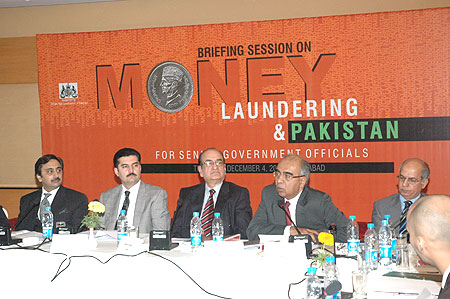
|
|
| |
|
|
| |
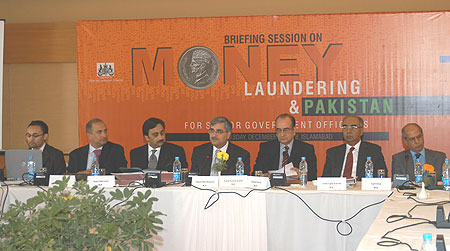
|
|
| |
|
|
| |
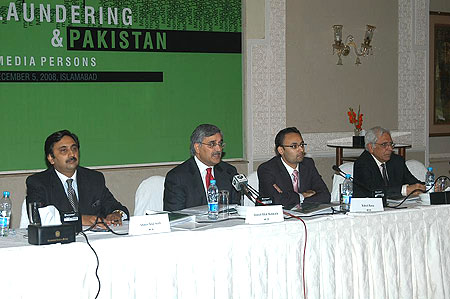
|
|
| |
|
|
| |
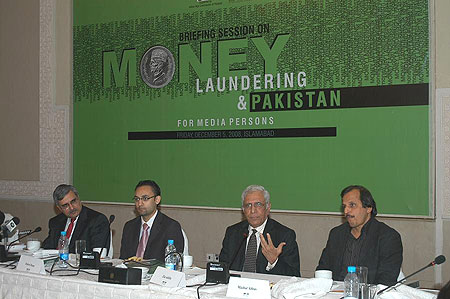
|
|
| |
|
|
| |
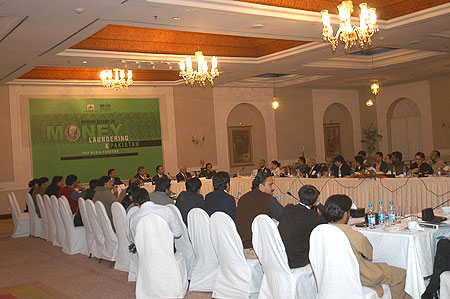
|
|
|
|
|
|
|
|
|